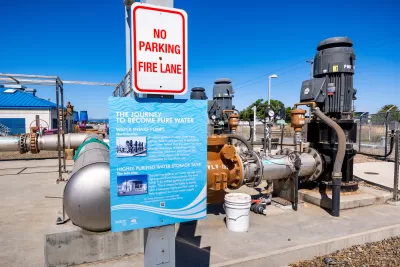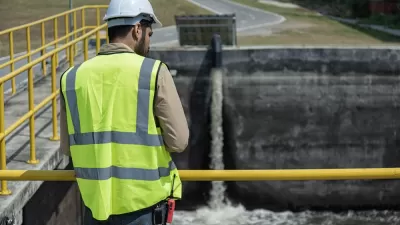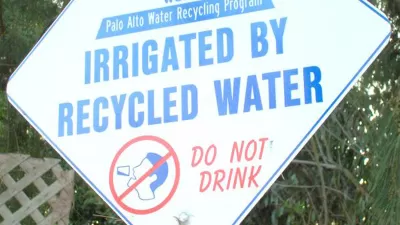Decentralized wastewater recycling systems take water conservation a step further by reducing the need for external infrastructure and keeping water recycling and reuse -in-house.’

“While centralized water reuse for nonpotable purposes has been around for decades, a trend called the ‘extreme decentralization of water and wastewater’—also known as ‘distributed water systems’ or ‘onsite’ or ‘premise’ recycling—is now emerging as a leading strategy in the effort to make water use more sustainable.” As Jim Robbins writes in Wired, in the future, buildings could become ‘water-neutral’ by recycling and reusing water in a closed loop system.
In 2015, San Francisco began requiring all buildings larger than 100,000 square feet to install onsite water recycling systems. “The headquarters of the San Francisco Public Utilities Commission has a black-water system, called the Living Machine, that treats its wastewater in engineered wetlands built into the sidewalks around the building, then uses it to flush low-flow toilets and urinals. The process reduces the building’s imported potable supply by 40 percent.” Recycling water onsite conserves both water and energy and reduces the need for costly infrastructure.
Experts call decentralized water recycling systems “the future of water” as water security becomes a more urgent global issue. But, for regulatory reasons, “A fully circular system, in which water is reused onsite for both potable and nonpotable uses, is at least five to 10 years away in this country, experts say.”
As Robbins points out, centralized water recycling systems have been in use for years, “But the new reuse paradigm fundamentally rethinks water systems, localizing them in much the same way that households and districts with rooftop and community solar have transformed energy systems away from centralized power plants.”
According to Aaron Tartakovsky, co-founder of Epic Cleantec, the systems being built in San Francisco have “written the playbook and de-risked the whole process” by providing a model framework for regulating and operating water recycling systems.
FULL STORY: Are You Ready for ‘Extreme’ Water Recycling?

Maui's Vacation Rental Debate Turns Ugly
Verbal attacks, misinformation campaigns and fistfights plague a high-stakes debate to convert thousands of vacation rentals into long-term housing.

Planetizen Federal Action Tracker
A weekly monitor of how Trump’s orders and actions are impacting planners and planning in America.

San Francisco Suspends Traffic Calming Amidst Record Deaths
Citing “a challenging fiscal landscape,” the city will cease the program on the heels of 42 traffic deaths, including 24 pedestrians.

Adaptive Reuse Will Create Housing in a Suburban Texas Strip Mall
A developer is reimagining a strip mall property as a mixed-use complex with housing and retail.

Study: Anti-Homelessness Laws Don’t Work
Research shows that punitive measures that criminalized unhoused people don’t help reduce homelessness.

In U.S., Urban Gondolas Face Uphill Battle
Cities in Latin America and Europe have embraced aerial transitways — AKA gondolas — as sustainable, convenient urban transport, especially in tricky geographies. American cities have yet to catch up.
Urban Design for Planners 1: Software Tools
This six-course series explores essential urban design concepts using open source software and equips planners with the tools they need to participate fully in the urban design process.
Planning for Universal Design
Learn the tools for implementing Universal Design in planning regulations.
Heyer Gruel & Associates PA
JM Goldson LLC
Custer County Colorado
City of Camden Redevelopment Agency
City of Astoria
Transportation Research & Education Center (TREC) at Portland State University
Jefferson Parish Government
Camden Redevelopment Agency
City of Claremont




























